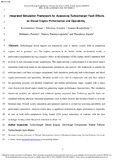JavaScript is disabled for your browser. Some features of this site may not work without it.
| dc.contributor.author | Ntonas, Konstantinos | |
| dc.contributor.author | Aretakis, Nikolaos | |
| dc.contributor.author | Roumeliotis, Ioannis | |
| dc.contributor.author | Pariotis, Efthimios | |
| dc.contributor.author | Paraskevopoulos, Yiannis | |
| dc.contributor.author | Zannis, Theodoros | |
| dc.date.accessioned | 2020-05-14T14:25:35Z | |
| dc.date.available | 2020-05-14T14:25:35Z | |
| dc.date.issued | 2020-05-08 | |
| dc.identifier.citation | Ntonas K, Aretakis N, Roumeliotis I, et al., (2020) Integrated simulation framework for assessing turbocharger fault effects on diesel-engine performance and operability. Journal of Energy Engineering, Volume 46, Issue 4, August 2020, Article number 04020023 | en_UK |
| dc.identifier.issn | 0733-9402 | |
| dc.identifier.uri | https://doi.org/10.1061/(ASCE)EY.1943-7897.0000673 | |
| dc.identifier.uri | https://dspace.lib.cranfield.ac.uk/handle/1826/15449 | |
| dc.description.abstract | Turbocharged diesel engines are extensively used in marine vessels, both as propulsion engines and as generator sets. The engine’s operation in the hostile marine environment results in performance degradation having a negative effect on the economics of the marine vessel’s operation both in terms of fuel consumption and maintenance. This paper presents a turbocharged four-stroke diesel engine simulation framework based on one-dimensional calculations and analysis. The framework is suitable for turbomachinery and heat exchanger components fault simulation predicting both turbocharger and diesel engine performance and operability. Mean-line models were used in conjunction with the beta lines method for generating accurate and detailed compressor and turbine performance maps, coupled with a single zone closed-cycle diesel engine model for generating engine performance characteristics. The simulation framework modules are adjusted and validated against measured data. Following specific faults are simulated utilizing physical consistent parameters such as blade friction and thickness based on relevant literature data. Overall system simulation and operation analysis is carried out assessing operability and performance parameters. Analysis results show a significant reduction in engine performance, especially in case of both turbo components being fouled (22% power reduction), in contrast with the heat exchanger fouling where the power reduction is about 1%. | en_UK |
| dc.language.iso | en | en_UK |
| dc.publisher | ASCE | en_UK |
| dc.rights | Attribution-NonCommercial 4.0 International | * |
| dc.rights.uri | http://creativecommons.org/licenses/by-nc/4.0/ | * |
| dc.subject | Model accuracy | en_UK |
| dc.subject | Parameters (statistics) | en_UK |
| dc.subject | Engines, | en_UK |
| dc.subject | Ships | en_UK |
| dc.subject | Chemical degradation | en_UK |
| dc.subject | Seas and oceans | en_UK |
| dc.subject | Petroleum | en_UK |
| dc.subject | Geological faults | en_UK |
| dc.title | Integrated simulation framework for assessing turbocharger fault effects on diesel-engine performance and operability | en_UK |
| dc.type | Article | en_UK |
Files in this item
The following license files are associated with this item:
This item appears in the following Collection(s)
-
Staff publications (SATM) [4360]

